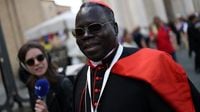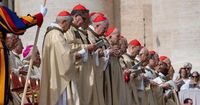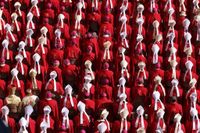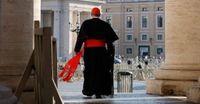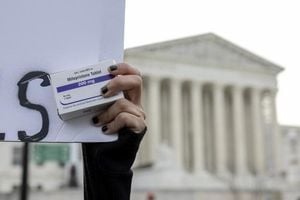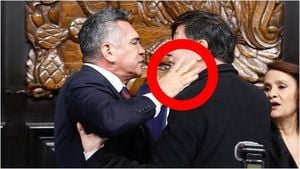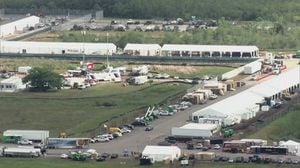As the Catholic Church prepares for a historic shift, 133 cardinals are set to enter the conclave on May 7, 2025, to elect the successor to Pope Francis, who passed away on April 21, 2025. This conclave, steeped in tradition and secrecy, will take place in the iconic Sistine Chapel, where the cardinals will gather to deliberate and vote on the next leader of the world’s 1.4 billion Catholics.
The day will commence with a mass at St. Peter's Basilica, officiated by 91-year-old Cardinal Dean Giovanni Battista Re, who presided over Pope Francis's funeral. Following this solemn service, the cardinals will process to the Sistine Chapel, where they will take an oath of secrecy, an essential part of the conclave process that ensures discussions remain confidential.
Once the oath is taken, the cardinals will be sequestered from the outside world, with mobile signals deactivated within the Vatican to prevent any communication. This isolation is designed to foster a focused environment for the electors as they engage in their deliberations.
Among the favorites to succeed Pope Francis are Italian Cardinal Pietro Parolin and Filipino Cardinal Luis Antonio Tagle. Parolin, 70, has served as the Vatican’s secretary of state since 2013 and is seen as a diplomat who embodies the moderate and outreach-focused legacy of Francis. Tagle, 67, known for his charisma and progressive views, could potentially make history as the first Asian pope in the modern era.
However, the conclave is not without its complexities. While many cardinals are thought to favor a continuation of Francis’s progressive approach, there are also voices within the church advocating for a return to more traditional values. This dichotomy reflects a broader tension within the Catholic Church, where the influence of conservative factions is felt strongly, particularly among cardinals over the age of 80 who are not eligible to vote but may sway the opinions of their younger counterparts.
Michael Higgins, an expert on papal transitions, suggests that a significant majority of the cardinal electors are supportive of Francis’s vision, emphasizing inclusivity and outreach to marginalized communities. “Many of them come from the peripheries, from the margins, which Francis loved,” Higgins noted in a recent interview. However, he also acknowledged the potential influence of older cardinals who might prefer a more conservative approach.
As the cardinals prepare to cast their votes, the initial rounds of voting will serve as a barometer for the candidates’ support. Historically, the first ballot is often scattered, with a clearer picture emerging in subsequent votes. If no candidate secures the required two-thirds majority, the cardinals will return to Casa Santa Marta for dinner, where informal discussions can further shape consensus.
Among the potential candidates are several other notable figures. Cardinal Robert Francis Prevost, an American, is regarded as an outsider with broad name recognition, while Cardinal Peter Turkson of Ghana is seen as a progressive choice who could carry forward Francis’s environmental and social justice legacy. On the other hand, Cardinal Péter Erdő of Hungary represents a more traditional outlook, potentially appealing to those who favor a return to the values of previous popes.
As the conclave unfolds, the world will be watching closely, with thousands of faithful gathered outside St. Peter's Basilica, eagerly awaiting the white smoke that will signal the election of a new pope. This moment will not only mark a new chapter for the Catholic Church but will also reflect the ongoing evolution of its leadership in a rapidly changing world.
The conclave’s proceedings are shrouded in mystery, as the cardinals are bound by their oath to secrecy, under penalty of excommunication. This adds a layer of intrigue to the process, as speculation abounds regarding who will emerge as the next pope. The history of papal elections is filled with surprises, and many experts caution against making definitive predictions.
As the cardinals gather in the Sistine Chapel, they will reflect on the legacy of Pope Francis, who sought to make the church more inclusive and responsive to contemporary issues. His tenure was marked by a focus on climate change, social justice, and outreach to marginalized communities, all of which will weigh heavily on the minds of the electors as they consider their options.
In the days leading up to the conclave, cardinals engaged in discussions about pressing global issues, including poverty, war, and climate change. These conversations will undoubtedly influence their choices as they seek a leader who can navigate the complex challenges facing the church today.
As the conclave begins, the anticipation builds. The question remains: will the new pope be a continuation of Francis’s vision, or will the cardinals choose a leader who takes a different path? The answer will shape the future of the Catholic Church for years to come.
With the eyes of the world upon them, the cardinals will engage in prayer and contemplation, striving to discern the will of God in their selection of the next pope. This sacred responsibility carries with it the hope and expectation of millions of Catholics worldwide, eager for a leader who will guide the church in an increasingly complex and challenging world.
